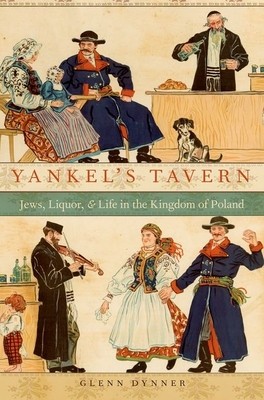
- We will send in 10–14 business days.
- Author: Glenn Dynner
- Publisher: Oxford University Press, USA
- ISBN-10: 0190204141
- ISBN-13: 9780190204143
- Format: 17.1 x 23.1 x 1.5 cm, softcover
- Language: English
- SAVE -10% with code: EXTRA
Reviews
Description
Awarded Honorable Mention for the Jordan Schnitzer Book Award In nineteenth-century Eastern Europe, the Jewish-run tavern was often the center of leisure, hospitality, business, and even religious festivities. This unusual situation came about because the nobles who owned taverns throughout the formerly Polish lands believed that only Jews were sober enough to run taverns profitably, a belief so ingrained as to endure even the rise of Hasidism's robust drinking culture. As liquor became the region's boom industry, Jewish tavernkeepers became integral to both local economies and local social life, presiding over Christian celebrations and dispensing advice, medical remedies and loans. Nevertheless, reformers and government officials, blaming Jewish tavernkeepers for epidemic peasant drunkenness, sought to drive Jews out of the liquor trade. Their efforts were particularly intense and sustained in the Kingdom of Poland, a semi-autonomous province of the Russian empire that was often treated as a laboratory for social and political change.Historians have assumed that this spelled the end of the Polish Jewish liquor trade. However, newly discovered archival sources demonstrate that many nobles helped their Jewish tavernkeepers evade fees, bans and expulsions by installing Christians as fronts for their taverns. The result-a vast underground Jewish liquor trade-reflects an impressive level of local Polish-Jewish co-existence that contrasts with the more familiar story of anti-Semitism and violence. By tapping into sources that reveal the lives of everyday Jews and Christians in the Kingdom of Poland, Yankel's Tavern transforms our understanding of the region during the tumultuous period of Polish uprisings and Jewish mystical revival.
EXTRA 10 % discount with code: EXTRA
The promotion ends in 17d.08:31:27
The discount code is valid when purchasing from 10 €. Discounts do not stack.
- Author: Glenn Dynner
- Publisher: Oxford University Press, USA
- ISBN-10: 0190204141
- ISBN-13: 9780190204143
- Format: 17.1 x 23.1 x 1.5 cm, softcover
- Language: English English
Historians have assumed that this spelled the end of the Polish Jewish liquor trade. However, newly discovered archival sources demonstrate that many nobles helped their Jewish tavernkeepers evade fees, bans and expulsions by installing Christians as fronts for their taverns. The result-a vast underground Jewish liquor trade-reflects an impressive level of local Polish-Jewish co-existence that contrasts with the more familiar story of anti-Semitism and violence. By tapping into sources that reveal the lives of everyday Jews and Christians in the Kingdom of Poland, Yankel's Tavern transforms our understanding of the region during the tumultuous period of Polish uprisings and Jewish mystical revival.


Reviews